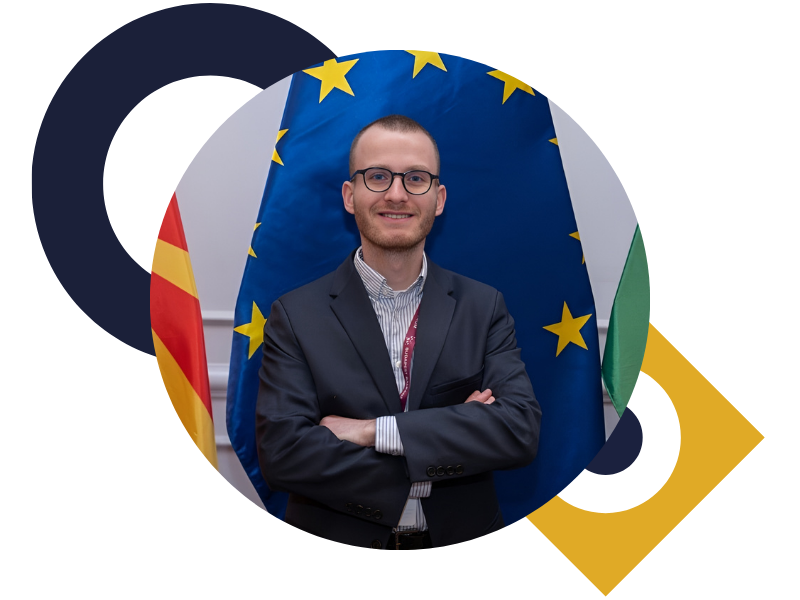“The university has always been a great help in the search for answers” – Ferenc Németh’s PhD story

The road to the doctoral programme
Ferenc completed his bachelor programme at ELTE, in the International Relations study programme. He continued his master programme in the same field, but now at Corvinus University of Budapest. After graduating, he studied abroad, in Graz and Belgrade. He did not apply for the doctoral programme immediately after completing his studies. During the gap years, he worked abroad, in Hungary, as a journalist, in the Press Office of EULEX Kosovo, but since 2009 he has been building his career as a Balkan researcher at the Hungarian Institute of International Affairs. During this period, he continued to pursue an academic career, publishing numerous papers on the subject and presenting regularly at conferences nationally and internationally, including in the United States of America. But Ferenc says that the years between his studies, the new stimuli and the experiences abroad have only confirmed his desire to deepen his knowledge and seek answers to the questions on his mind.
About the programme
“In Hungary, this is the only doctoral programme recognised internationally that fits into my research field, if only because it is very interdisciplinary,” said Ferenc, explaining why he chose Corvinus. He considers it an outstanding advantage of the programme that everything is conducted in English, as this makes it more accessible not only to the Hungarian but also to the international research community. “I have foreign classmates who also provide a new perspective. Different perspectives enrich my work, both professionally and personally,” he continued
Balkan security policy, previous research
Ferenc’s current research focuses on the inter-ethnic relations and foreign relations of Northern Macedonia. It examines the effect of inter-ethnic relations in the country on the foreign policy of Northern Macedonia. He has been interested in the Balkans for almost 10 years, has published on the subject in various papers, and has also used the subject as the basis for his earlier theses. “The region is very diverse, inhabited by people of many different religions and ethnicities. However, there are many unresolved issues related to this, be it bilateral disputes in Bosnia and Herzegovina or between Serbia and Kosovo,” he said. His bachelor thesis focused on Bosnia and Herzegovina, and more specifically on the security challenges in the country, while his master thesis analysed the war between Serbia and Kosovo from a security policy perspective. Ferenc stressed that it is important to deal with these topics, as surprisingly few young Hungarian researchers and experts are interested in the Balkans, even though the region is within reach.
Personal experiences
“The biggest advantage of research in the Balkans is that the area is very close to Hungary,” said Ferenc, who travels to the region he researches relatively often, even for a long weekend. “Corvinus also supports PhD students in this respect, and there are several grants that enable short-term research mobility. It encourages students to spend a few weeks in their chosen area, build contacts or attend conferences,” he continued. For his doctoral dissertation, he is interviewing Macedonian and Albanian politicians. Through semi-structured interviews, he seeks to answer the question of the role of Northern Macedonian Albanians in shaping the country’s foreign policy strategy.
Balancing study and work
“My doctoral studies and my work complement each other. I feel that the competences I am acquiring at Corvinus can be incorporated into my everyday work,” said Ferenc, who considers the research methodology skills he acquired during his doctoral programme to be extremely useful. He believes that a young expert should be able to find a place in as many fields as possible, for example, he is particularly attracted to teaching. “I like to exchange ideas with students, which also inspires new ideas in me. It encourages me to delve deeper into certain topics,” he said, highlighting the benefits. He would like to continue as a lecturer after completing his doctoral programme. He believes that to become an expert in a particular field, one must be able to hold one’s own in both the academic and practical worlds.
Teaching
“Teaching is an opportunity that doctoral students should definitely take advantage of during their time at university,” said Ferenc. But alongside the positive side, there are also challenges. He shared that giving a class, for example, requires much more preparation than one might first think. It’s also difficult to keep students’ attention for 90 minutes, so he tries to make his classes interactive and engage students in discussions. He is not a fan of frontal teaching, he always puts the emphasis on discussion and reflection.
Written by: Fruzsina Máriássy